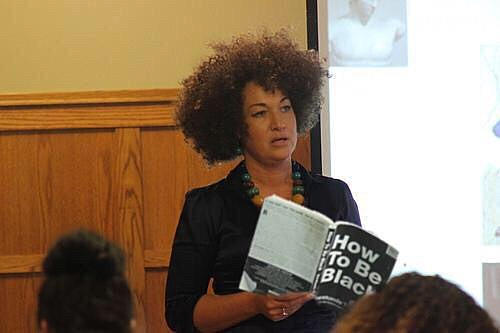Q & A with Ana Carolina Vidal + her Afro-Futuristic project
Rooted In Magazine
2015-07-08
Annina Chirade

O Mestiço Revisited II, Ana Carolina Vidal
São Paulo native, Ana Carolina Vidal, is a multi-racial Brazilian artist who explores the dynamics of her country through her art. Her work is largely focused on portraiture; each piece in her ongoing Afro-Futuristic project is both an affirmation and reimagining of her identity. Through each subject, she pushes for us to see the ancestors that exist within us. Her gaze is filled with an emotional honesty towards a society still at odds with its past. Ana centres her Indigenous, African and European roots within a larger social framework; the political and personal can’t help but be intertwined in her work.
It’s precisely because of her honesty that one is able to understand the deep love she has for her homeland. In every conversation we’ve had, her knowledge and quest to share the fullness of her country’s many cultures leaves one wanting to know more. She embraces its music, art, film, literature, dance, food and politics with passion. Ana is part of a young generation looking to break down the simplistic images many have of Brazil, and to shape its future. She has even created a Tumblr page, Brasil of Color, to let fellow Brazilians learn and share their histories. So how does her art speak to a society so awash with culture and complexity? I set up an interview to find out.
Annina: What is your background as an artist – do you consider yourself as mostly self-taught?
Ana: When I was a child, my aunt was my first contact with art. She was a painter and inspired me to pursue what I love – even if it took me a lifetime – I should do it! I would bother my parents a lot as a child to put me in a local artisan group; they taught me some handicrafts and how to paint, but I took those classes for a short period. Then when I was very young at school I took extra-curricular painting classes. In my teenage years I stopped painting. I was mainly self-taught, I still feel I need to learn so much. I think it’s interesting to have that academic basis, not only of techniques, but ways of thinking and building your creative process; learning new ways to relate to art that are different from the ways you already do…
…Annina: In your work you give special focus to Afro-Brazilian and Indigenous people, why is that important to you?
Ana: I think it’s important to reaffirm myself to me. Although I have many privileges by being white-passing, my family is so multi-racial. I heard a lot of stories and encountered so many backgrounds which were extremely different. I always had the feeling that most of my family got lost in time; you don’t know the name of someone, you don’t know their story, because many of them were very poor. I always wanted to document them so that they would no longer be forgotten.
We have this myth of ‘Brazilian racial democracy’, but we know our [people of colour] experiences are different and I could always see that growing up. I could see how different my father’s life was from my mother’s; how my mother could get further being a white woman. In my father’s family, I could see the difference between him as a black man and my aunt’s as black women; how they stayed behind for obvious gender and race reasons. Although I am privileged enough to not go through a lot of that, I was still affected in many ways. I still hear comments – they are less offensive – I’m always questioned about my identity…
Read the entire interview here.

